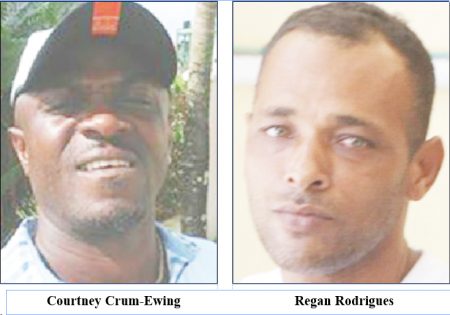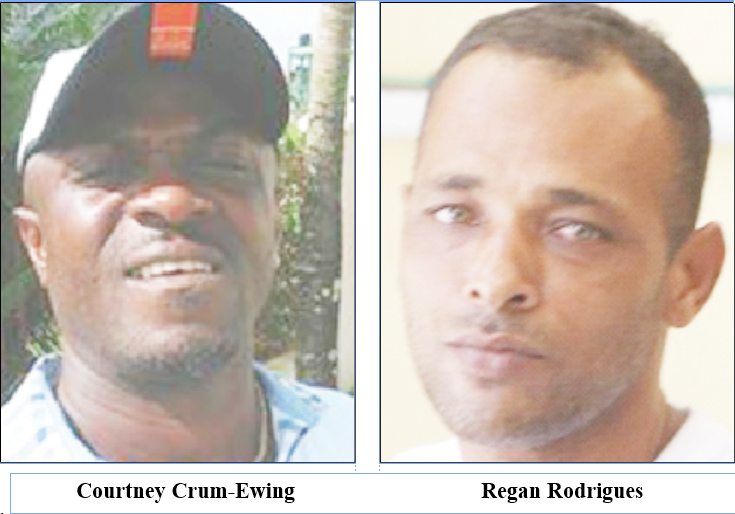Magistrate Judy Latchman has appealed the recent ruling by Justice Brassington Reynolds compelling her to abide by the directions of the Director of Public Prosecutions (DPP) and commit accused Regan ‘Grey Boy’ Rodrigues to stand trial for the murder of political activist Courtney Crum-Ewing.
The magistrate has also asked the Court of Appeal to stay the judge’s order, until her appeal has been fully heard and determined.
No stay has yet been granted. The case will be called for the first time before the Court of Appeal on December 12, when attorney for the magistrate Arudranauth Gossai is expected to address the court on this request.
Thereafter, a date is likely to be set for the appeal to be heard.
At the conclusion of a preliminary inquiry (PI) on June 5, Magistrate Latchman found that a prima facie case had not been established and discharged Rodrigues, ruling that there was no case against him.

However, Magistrate Latchman has since then maintained that she would be unable to comply with the DPP’s directive, as she had found no evidence presented by the prosecution that it was Rodrigues who killed Crum-Ewing.
Ali-Hack issued the directive by way of a letter to Magistrate Latchman, while citing provisions set out in Section 72 (2) (ii) (a) of the Criminal Law (Procedure) Act. “I hereby remit to Your Worship the above-mentioned matter and direct you to comply with Sections 65 and 66 of the Criminal Law (Procedure) Act (CLPA), Chapter 10:01 with a view to committing the accused,” the letter stated.
After the magistrate made it clear that she was not going to comply with the directive, the DPP commenced proceedings in the High Court, seeking among other things, that she shows why her decision to discharge the accused, should not be declared ultra vires, null and void.
In her application, the DPP advanced that the magistrate exceeded her authority in refusing to comply with her instructions to commit Rodrigues to trial.
The state also sought an order or rule nisi of certiorari directed to Magistrate Latchman, to show why her non-compliance with sections 65 and 66 of the CLPA Cap. 10:01; after receiving directions from the DPP to re-open the enquiry, to comply with Section 72 (2) (ii) (a); should not also be quashed for being void.
Finally, the DPP sought the similar order, directing the magistrate to show why she should not be compelled and directed to re-open the PI as directed.
In an oral ruling delivered on November 17, Justice Reynolds said the court was unsatisfied that the magistrate had sufficiently shown why the interim orders, quashing her decision to refuse to comply with the DPP’s directions and compelling her to abide by them, should not be made absolute.
The court said it was satisfied that Magistrate Latchman “misconstrued and misapprehended her statutory obligations.”
It was a contention of the DPP that the magistrate “is not vested with a discretion, statutory or otherwise, to refuse to comply with the provisions of Section 72 (2) (ii) (a) of the CLPA, Chapter 10:01.
Noting that she was dissatisfied with Justice Reynolds’ ruling, Magistrate Latchman is contending that the judge’s decision cannot be supported, having regard to the evidence and the law. It is against this backdrop that she argues he did not properly assess the evidence and/or the law in arriving at his decision, while further arguing that he failed to adequately consider and/or misdirected himself on the law relating to the subject.
Among the 18 grounds listed in her appeal, the magistrate contends that the judge erred in law and/or misdirected himself on the law in failing to address adequately or at all the issue that under the provisions of the Constitution and the CLPA, only an independent judicial tribunal can make a determination of whether an accused person should be committed to stand trial in the High Court.
Further, she said the judge erred when he ruled that a PI was not a trial, and therefore the she (the Appellant) was a “mere gate-keeper” tasked with the collection of evidence.
According to the magistrate, another error made by the judge was his failure to address adequately or at all, the fact that use of the words “with a view to commit” as stated in Sections 65 and 66 of the CLPA, Chapter 10:01; left up to her, the ultimate decision on whether to commit.
Magistrate Latchman wants the Appeal Court to reverse and/or vary Justice Reynolds’ ruling.
In justifying ruling in the case against Rodrigues, the magistrate had said that while she was satisfied from the evidence presented that Crum-Ewing was shot with a .32 pistol that was found in a house, there was no evidence that Rodrigues used the gun, pulled the trigger and shot Crum-Ewing.
She further stated that she took into consideration the 14 oral statements that were made by Rodrigues and found that they in no way implicated him in the murder. In the circumstances, she said there was no case for Rodrigues to answer, and he was resultantly discharged.
At the conclusion of the PI, attorney Nigel Hughes, the Special Prosecutor, had said that the magistrate admitted into evidence caution statements deemed to have been made freely and voluntarily by Rodrigues, arguing that the decision to discharge him should have been left for a jury to decide.
Section 73 (2) (ii) (a) of the Criminal Law (Procedure) Act states, “Where before the discharge of the accused person the provisions of sections 66 and 67 have not been complied with and the Director of Public Prosecutions, after the receipt of those documents and things, is of opinion that the evidence given on behalf of the prosecution had established a prima facie case against the accused, the Director of Public Prosecutions may remit those documents and things to the magistrate with directions to reopen the inquiry and to comply with sections 66 and 67, and may give such further directions as he may think proper.”
Section 73 (2) (ii) (b) adds, “After complying with the directions given by the Director of Public Prosecutions under subparagraph (a), the magistrate may either commit the accused for trial or he may adjourn the inquiry and, subject to any directions on the matter given by the Director of Public Prosecutions, forthwith notify the Director of Public Prosecutions who shall give any further directions as he may deem fit and, if of opinion that a sufficient case has been made out for the accused to answer, may direct the magistrate to commit the accused for trial.”
The magistrate’s decision to discharge Rodrigues came just over two months after Ali-Hack had ordered that the PI be re-opened for additional evidence to be taken from police witnesses.
Prior to the most recent discharge, Magistrate Latchman, on September 14, last year, found that there was no evidence against Rodrigues implicating him in the murder and therefore discharged him.
Four months later, the magistrate was sent a letter from the DPP, directing her to reopen the case which she did, for further evidence to be taken from police witnesses.
Thereafter, she again found that a prima facie case had not been made out against Rodrigues, and resultantly discharged him.
Crum-Ewing was gunned down in Diamond, while urging persons to vote in the May, 2015 elections.
Rodrigues had been charged in July, 2015 with unlawful possession of a pistol and 14 live rounds of ammunition. The gun was reported to have been linked to the murder of Crum-Ewing and formed the basis for the murder charge.
He was later freed of those charges after a court found that the prosecution failed to prove that he had had knowledge and possession of the articles.
A month after being discharge of the capital offence for the second time, however, Rodrigues was sentenced to three months behind bars for threatening Crum-Ewing’s mother. On October 11, Magistrate Dylon Bess imposed the sentence against Rodrigues, who vociferously maintained his innocence.





